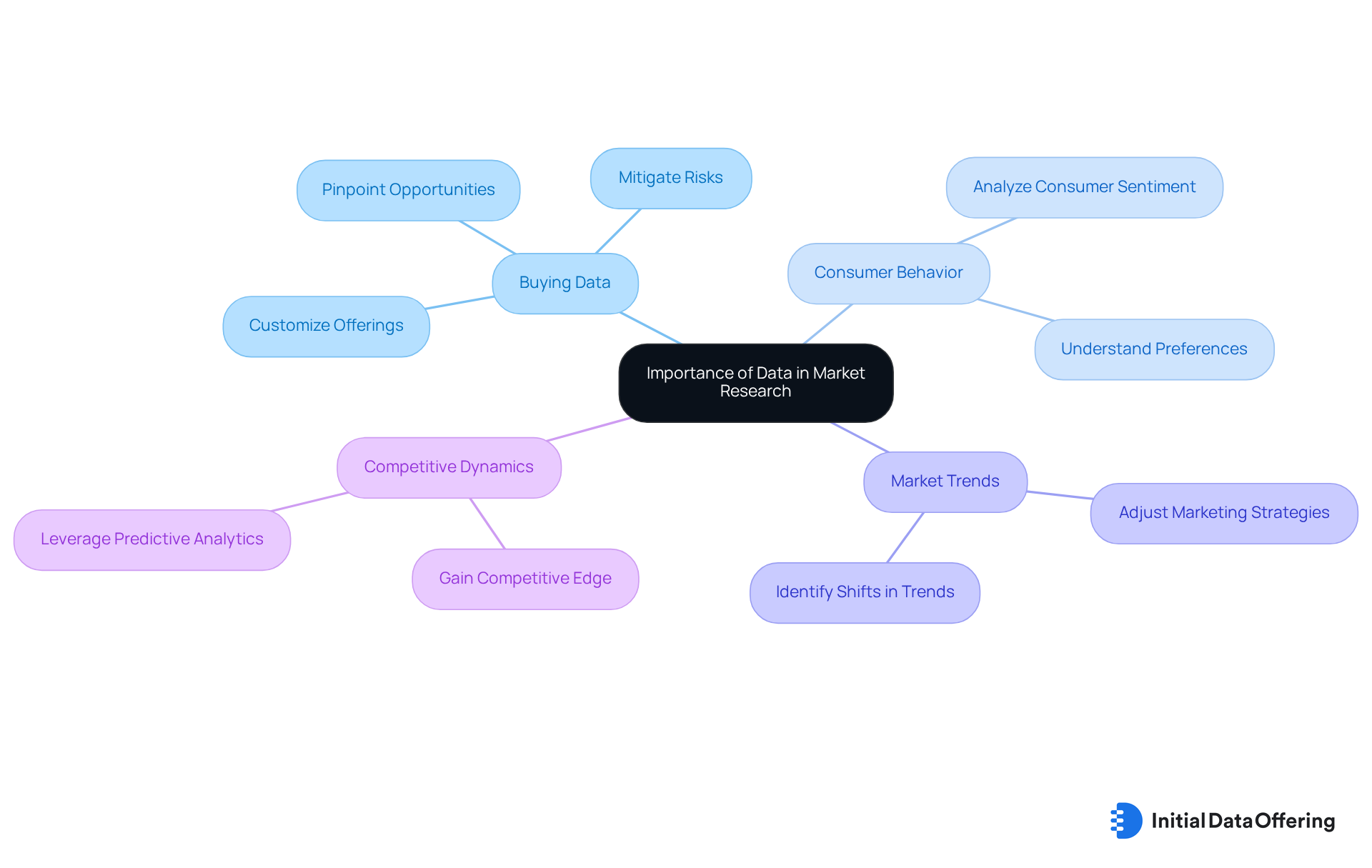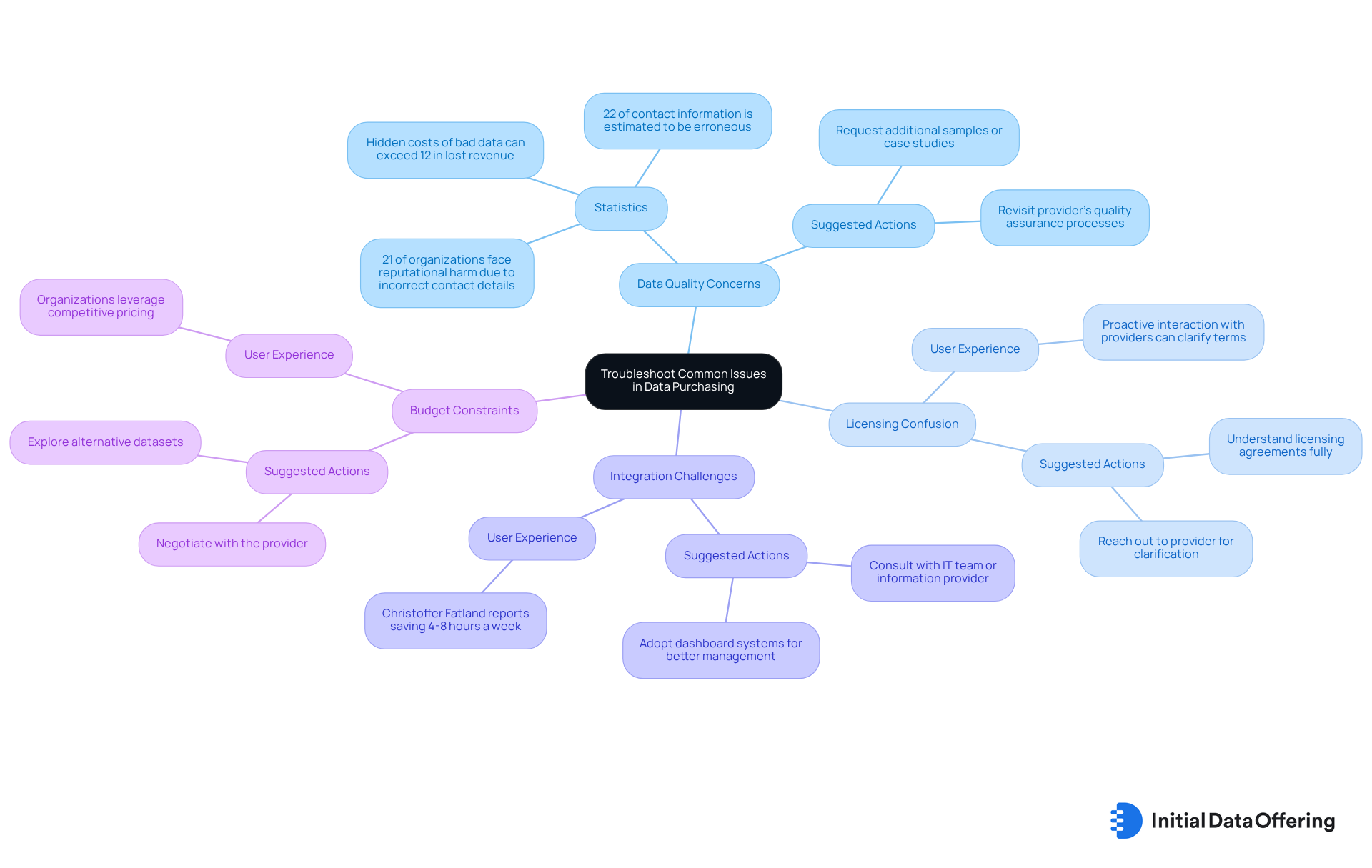4 Steps to Buy Data Effectively for Market Research

4 Steps to Buy Data Effectively for Market Research
Overview
The article delineates four essential steps for effectively purchasing data for market research:
- Determining information requirements
- Researching suppliers
- Evaluating data quality
- Making the purchase
This structured approach is crucial as it aids businesses in identifying their specific needs, selecting trustworthy sources, ensuring the accuracy of the data, and navigating the complexities of data licensing and integration. Ultimately, this leads to informed decision-making and enhanced business outcomes.
How can these steps transform your market research strategy? By clearly defining your information requirements, you set the foundation for success. Researching suppliers allows you to discover reliable sources, while evaluating data quality ensures that the information you acquire is accurate and relevant. Making the purchase is the final step, but it is informed by the thorough groundwork laid in the previous stages.
In conclusion, following this structured approach not only streamlines the data purchasing process but also significantly improves the quality of insights derived from the data, fostering better business decisions and outcomes.
Introduction
In an era where data drives decision-making, the ability to effectively purchase quality information is crucial for businesses aiming to stay competitive. The features of data acquisition empower organizations to uncover market trends and consumer behaviors, while the advantages of understanding these nuances enhance their strategic initiatives. However, with numerous options and potential pitfalls in the data marketplace, companies must consider:
- How can they ensure informed purchases that truly benefit their research efforts?
This guide explores essential steps for navigating the complexities of buying data, ensuring that organizations can leverage insights to propel their success.
Understand the Importance of Data in Market Research
To shape business strategies and decisions, companies often buy data, which serves as the backbone of industry research by offering vital insights. In an increasingly data-driven landscape, understanding how to buy data on consumer behavior, market trends, and competitive dynamics is paramount for success. High-quality information empowers businesses to pinpoint opportunities, mitigate risks, and customize their offerings to align with customer needs when they buy data.
For instance, analyzing consumer sentiment information can uncover shifts in preferences. This enables companies to adjust their marketing strategies effectively. Research indicates that organizations that buy data and leverage data-driven decision-making experience a 15% average revenue increase. This statistic highlights the tangible benefits of informed choices.
Conversely, without a thorough understanding of its significance, businesses risk making uninformed decisions. This can potentially lead to missed opportunities or costly errors. The capability to utilize information effectively is not just beneficial; it is crucial for succeeding in today's competitive landscape.

Follow a Step-by-Step Process to Purchase Data
- Determine Your Information Requirements: Begin by precisely outlining the specific details necessary for your analysis. What questions need answering? What insights will inform your decisions? A comprehensive needs evaluation is essential; 95% of market research experts acknowledge that sophisticated information analysis is a vital technology influencing the sector.
- Research Information Suppliers: Seek trustworthy providers or marketplaces that offer collections aligned with your needs. Platforms like Initial Information Offering (IDO) serve as excellent launching pads where users can buy data, curating quality datasets across various domains, including finance, social media, and environmental studies.
- Evaluate Information Quality: Before making a purchase, critically assess the quality of the information. Is it accurate, relevant, and timely? Look for reviews that demonstrate the information's effectiveness in real-world applications. For instance, IDO's dataset comprises anonymized and aggregated information at the security level, encompassing 15,000 equities with historical records starting from February 2017.
- Make the purchase: After identifying a suitable dataset, proceed to buy data. Ensure you fully comprehend the terms of use and any licensing agreements linked to the information. This step is crucial, as the global market research sector is anticipated to generate $140 billion in revenue in 2024, highlighting the competitive environment for quality information.
Utilize Tools and Resources for Effective Data Acquisition
To facilitate effective data acquisition, consider utilizing the following tools and resources:
- Data Marketplaces: Platforms such as Initial Data Offering (IDO) offer access to a diverse array of datasets from multiple providers, streamlining the search process for specific data needs. The anticipated expansion of demand for information marketplaces in 2025 indicates that organizations will increasingly depend on these platforms for high-quality information sourcing. Given the fragmented character of the information marketplace, these platforms are vital for linking information providers with prospective purchasers who want to buy data. By subscribing to Initial Information Offering today, you can buy data from new datasets listed daily and gain premium access to exclusive collections.
- Data Quality Assessment Tools: Tools like Talend and Trifacta are essential for evaluating the quality of datasets before deciding to buy data. Ensuring information reliability is crucial, particularly when you buy data, as poor quality can undermine findings and decision-making processes. Notably, only 20% of analytics insights are anticipated to produce business results through 2022, emphasizing the significance of investing in trustworthy information to enhance outcomes.
- Market Analysis Software: Tools such as Qualtrics and SurveyMonkey help organizations buy data more effectively, enabling deeper insights and more efficient study strategies. These tools are essential for incorporating gathered information into broader industry analysis initiatives, particularly as firms that buy data and have more information-savvy employees are likely to thrive in a content-rich setting. How can these applications enhance your analytical capabilities?
- Industry Reports and Statistics: Resources like Statista and MarketResearch.com offer valuable insights and figures that can improve your strategies to buy data. Leveraging these reports can provide context and improve your understanding of market trends and consumer behavior, which is essential for effective market research. What insights can you glean from these resources to inform your strategies?
Troubleshoot Common Issues in Data Purchasing
When acquiring information, several common issues may arise. Understanding how to troubleshoot these effectively is crucial for ensuring success:
-
Data Quality Concerns: If the data does not meet your expectations, it is essential to revisit the provider’s quality assurance processes. Requesting additional samples or case studies can help confirm the reliability of the information. Statistics indicate that 21% of organizations face reputational harm due to incorrect contact details, with an estimated 22% of contact information being erroneous. This underscores the necessity of ensuring accuracy before you buy data. Furthermore, the concealed expense of poor information can exceed 12% in lost revenue, highlighting the importance of diligence in this area.
-
Licensing Confusion: Licensing confusion can be minimized by fully understanding the licensing agreements before you buy data. Misunderstandings can lead to legal complications. If anything is unclear, reaching out to the provider for clarification is advisable. Companies have successfully addressed licensing concerns by proactively interacting with information providers to clarify terms, thereby avoiding potential pitfalls.
-
Integration Challenges: If you encounter difficulties incorporating the information you bought into your current systems, consulting with your IT team or the information provider is recommended to buy data more effectively. They may offer tools or guidance to facilitate integration. For instance, organizations that have adopted dashboard systems have reported enhanced information management and collaboration, emphasizing the advantages of efficient integration. User Christoffer Fatland shares that the platform saves him between four and eight hours a week, showcasing the efficiency gained through proper data management.
-
Budget Constraints: If the cost exceeds your budget, it may be beneficial to negotiate with the provider or explore alternative datasets that offer similar insights at a lower price. Many organizations have successfully navigated budget constraints by leveraging competitive pricing or seeking out less expensive datasets that still meet their research needs.

Conclusion
In the realm of market research, the ability to effectively buy data is not just an advantage but a necessity for businesses aiming to thrive. This article has outlined a comprehensive approach to data acquisition, emphasizing the critical nature of understanding data's role in shaping strategic decisions. By following the steps provided, organizations can enhance their market research capabilities and make informed choices that drive success.
The key steps discussed include:
- Identifying specific information needs
- Researching reliable data suppliers
- Evaluating the quality of the data
- Understanding the terms of purchase
Additionally, utilizing tools and resources such as:
- Data marketplaces
- Quality assessment tools
- Market analysis software
can significantly streamline the data acquisition process. Addressing common issues like data quality concerns and licensing confusion is also essential to ensure a smooth purchasing experience.
Ultimately, the effective use of data in market research can lead to increased revenue and improved decision-making. As the demand for high-quality data continues to grow, organizations are encouraged to adopt these best practices and leverage available resources. By prioritizing data-driven strategies, businesses position themselves to not only meet but exceed the challenges of a competitive market landscape.
Frequently Asked Questions
Why is data important in market research?
Data is crucial in market research as it provides vital insights that shape business strategies and decisions, helping companies understand consumer behavior, market trends, and competitive dynamics.
How does buying data benefit businesses?
Buying high-quality data empowers businesses to identify opportunities, mitigate risks, and customize their offerings to meet customer needs, ultimately enhancing their chances of success.
What can analyzing consumer sentiment information reveal?
Analyzing consumer sentiment information can uncover shifts in preferences, allowing companies to adjust their marketing strategies effectively.
What impact does data-driven decision-making have on revenue?
Research indicates that organizations that buy data and leverage data-driven decision-making experience an average revenue increase of 15%.
What risks do businesses face if they do not understand the importance of data?
Without a thorough understanding of data's significance, businesses risk making uninformed decisions, which can lead to missed opportunities or costly errors.
Why is the capability to utilize information effectively crucial for businesses?
The ability to utilize information effectively is crucial for succeeding in today's competitive landscape, as it enables informed decision-making and strategic planning.